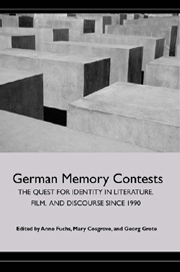Book contents
- Frontmatter
- Contents
- Acknowledgments
- Introduction: Germany's Memory Contests and the Management of the Past
- Positions
- Mediations
- Ethnicity/Hybridity
- Memory Politics
- 11 The Anxiety of German Influence: Affiliation, Rejection, and Jewish Identity in W. G. Sebald's Work
- 12 Between “Restauration” and “Nierentisch”: The 1950s in Ludwig Harig, F. C. Delius, and Thomas Hettche
- 13 On Forgetting and Remembering: The New Right since German Unification
- 14 A Heimat in Ruins and the Ruins as Heimat: W. G. Sebald's Luftkrieg und Literatur
- Works Cited
- Notes on the Editors and Contributors
- Index
11 - The Anxiety of German Influence: Affiliation, Rejection, and Jewish Identity in W. G. Sebald's Work
from Memory Politics
Published online by Cambridge University Press: 05 February 2013
- Frontmatter
- Contents
- Acknowledgments
- Introduction: Germany's Memory Contests and the Management of the Past
- Positions
- Mediations
- Ethnicity/Hybridity
- Memory Politics
- 11 The Anxiety of German Influence: Affiliation, Rejection, and Jewish Identity in W. G. Sebald's Work
- 12 Between “Restauration” and “Nierentisch”: The 1950s in Ludwig Harig, F. C. Delius, and Thomas Hettche
- 13 On Forgetting and Remembering: The New Right since German Unification
- 14 A Heimat in Ruins and the Ruins as Heimat: W. G. Sebald's Luftkrieg und Literatur
- Works Cited
- Notes on the Editors and Contributors
- Index
Summary
The Desire for Influence
In a stimulating article on travel in W. G. Sebald's writing, John Zilcosky puts forward the argument that Sebald overturns a Romantic and postmodern travel strategy, which consists of getting lost only to recover oneself finally with greater clarity and a more assured sense of identity. Such a travel paradigm is based on upholding a clear dichotomy between home and away. Zilcosky argues that Sebald's deconstruction of this traditional opposition differentiates him from contemporaries such as Roland Barthes, who transform the margin into a new home, making it into familiar territory. Resisting any “disingenuous attempt to turn the margin into a new centre,” Sebald's travel texts instead present all locations in terms of the in-between zone of the familiar-strange, the uncanny. According to Zilcosky, being hopelessly lost is therefore not the central image of these texts. On the contrary, it is the “ … inability to lose one's way that haunts Sebald's travel narratives” (Z, 104). With this in mind, Zilcosky goes on to provide an interesting psychoanalytically-based reading of Schwindel. Gefühle (Vertigo, 1990) and Die Ausgewanderten (The Emigrants, 1992), arguing that in these texts the glimpse of the familiarstrange is always accompanied by a sense of dismay and fear (Z, 107). This is because familiarity is an impediment to the invention of a creative self. The consequences of the persistence of the familiar and the already-known are devastating for the burgeoning writer, as in the case of Schwindel.
- Type
- Chapter
- Information
- German Memory ContestsThe Quest for Identity in Literature, Film, and Discourse since 1990, pp. 229 - 252Publisher: Boydell & BrewerPrint publication year: 2006

